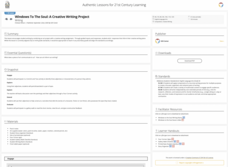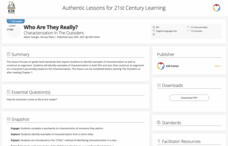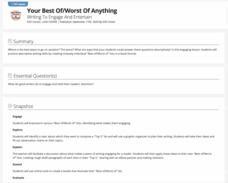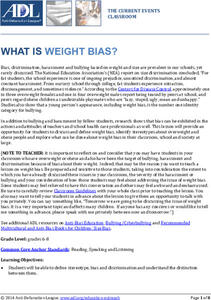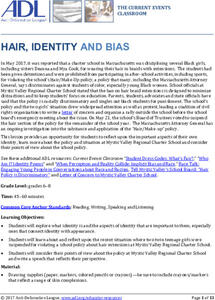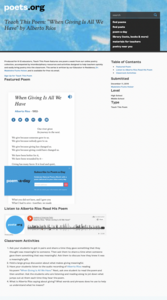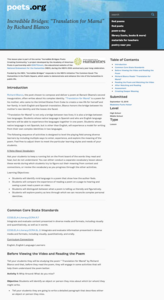K20 LEARN
Windows To The Soul: A Creative Writing Project
The eyes have it in a project that combines art with creative writing. Class members list three adjectives or characteristics of a person they admire. Then draw a picture of a pair of eyes that they feel reflects these characteristics....
K20 LEARN
Who Am I? Creating And Editing Descriptive Writing
With descriptive writing, the pleasure is in the details. Young writers learn how to add sensory details to a paragraph about themselves. They read a short paragraph and identify the sensory details used. After revising their draft...
K20 LEARN
Writing An Argumentative Paragraph: Argumentative Writing
Learning how to craft a cogent argument based on a solid claim, supported with evidence and solid reasoning, is an important life skill. Teach middle schoolers about argumentative writing with a instructional activity asking them to...
K20 LEARN
Who Are They Really?: Characterization In The Outsiders
Ponyboy, Johnny, Winston, and Darry come alive in a lesson that focuses on the details S. E. Hinton uses to characterize the Greasers and the Socials. The class first observes the actors' words; the thoughts revealed their effect on...
K20 LEARN
Who's Coming To Dinner? Descriptive Writing
"The Dinner Party" is the anchor text in a lesson designed to encourage writers to use sensory details in their stories. After brainstorming descriptive words and phrases for the five senses, class members read Mona Gardner's...
K20 LEARN
Writing Wrongs Mini Lesson: Peer Editing And Revising
High schoolers draft a paragraph about their stance on the issue of school uniforms and share their work with a peer for editing. After watching a parody video about peer editing and revising, class members generate a "Top 10 list"...
K20 LEARN
Your Best Of/Worst Of Anything: Writing To Engage And Entertain
It was the best of places! It was the worst of places! Middle schoolers practice their descriptive writing skills by creating an e-book about the best of/worst of topics. A series of activities about descriptive writing and worksheets...
Anti-Defamation League
Dealing with the Social Pressures that Promote Online Cruelty
Why do people engage in cyberbullying? What can be done about it? These are the questions middle schoolers consider in a very timely lesson. Participants view PSA announcements, read a case study, and participate in scenarios designed to...
Learning for Justice
Cliques in Schools
Band geeks, jocks, preppies; every school has its groups. Middle and high schoolers identify the various friendship groups and cliques in their school and consider these groups' positive and negative traits. After completing a Clique...
Anti-Defamation League
What Is Weight Bias?
After setting rules and expectations to create a safe place to share thoughts and feelings, scholars define the terms; stereotype, basis, and discrimination. Using a web brainstorm, learners list words associated with overweight and...
Learning for Justice
Looking Closely at Ourselves
A thoughtful discussion about self-reflecting leads to a conversation about skin color and making a list of words associated with "beauty." Budding artists use a mirror to examine their features and create a self-portrait. Peers critique...
Anti-Defamation League
Don't Let Hate Ruin the Fun: Youth and Online Games
Gamers unite! Take action against bullying and hate speech in online video games! After reading data that reveals the extent to which various age groups experience hate and, or harassment while playing video games online, groups develop...
Anti-Defamation League
Hair, Identity and Bias
Middle schoolers weigh in on dress codes, specifically those that apply to hair and make-up, with a lesson that uses a 2017 case from a charter school in Massachusetts. Class members read about two girls suspended for violating the...
Anti-Defamation League
Hair Discrimination and the CROWN Act
The CROWN Act (Creating a Respectful and Open World for Natural Hair) is the subject of the lesson that asks groups to research the stories of five different women and share their insights in a jigsaw activity. Participants then craft...
Anti-Defamation League
Teens, Tech, Connect: How Technology Impacts Teenagers' Friendships
To understand their time spent online, class members chart their use of technology during early morning hours, during school, after school, in the evenings, and on weekends. They then read several reports about how social media...
Learning for Justice
Recognizing Discrimination
Empower scholars to take a peaceful stand against discrimination. The color of their clothes separates learners; then, only some are allowed to go to recess—this sparks a discussion about the concept of discrimination and how they felt...
Academy of American Poets
Teach This Poem: "Tamales on Christmas" by Christian Robinson
A instructional activity spotlights the poem "Tamales on Christmas" by Christian Robinson. Scholars discuss their favorite foods and then examine a lively picture of a family preparing tamales. After listening to the poem twice, learners...
Teaching for Change
Latino/Hispanic Heritage Resource Packet
Here's a must-have resource for Latino/Hispanic heritage month, September 15 through October 15. The 18-page packet includes suggestions to guide your planning, quizzes to test knowledge of heritage facts and immigration myths, and...
Academy of American Poets
On "El Florida Room" by Richard Blanco
Scholars of all ages examine Richard Blanco's poem, "El Florida Room." Looking closely at pictures, pupils look for details that stand out to them, then read the poem. A whole-class discussion allows learners to reflect on what they...
Academy of American Poets
Teach This Poem: "When Giving Is All We Have" by Alberto Ríos
What makes giving meaningful? Class members discuss this question, then listen to Alberto Rios reading his poem, "When Giving Is All We Have." Finally, the class considers what the poet says about the question.
Academy of American Poets
Incredible Bridges: “Translation for Mamá” by Richard Blanco
Who or what do you miss? That's the question that launches an activity that asks writers to craft a paragraph filled with sensory details that shows how they feel. Next, they listen to Richard Blanco reading his poem, "Translation for...
Academy of American Poets
Teach This Poem: "When There Were Ghosts" by Alberto Ríos
Before cell phones, tablets, and computers with access to YouTube, before gleaming multiplexes and even before television, there were small theaters with Saturday night black and white movies. Alberto Ríos's poem "When There Were Ghosts"...
Anti-Defamation League
Who Was César Chávez?
Scholars complete a KWL chart to indicate what they know about Cesar Chavez and then research what they want to know about this farm worker, labor leader, and civil rights activist. To complete the lesson plan, scholars research modern...
National Endowment for the Humanities
"Sí, se puede!": Chávez, Huerta, and the UFW
"Sí, se puede!" Cesar Chavez and Dolores Huerta believed organizing farm workers and changing their working conditions were possible. Scholars examine provisions of the Bracero Program, videos, and the United Farm Workers' (UFW) work....
